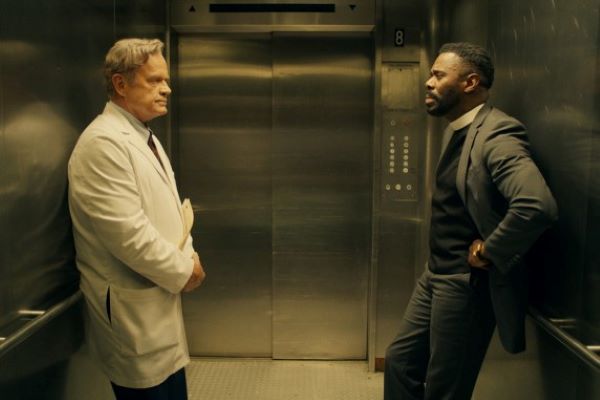The heart is only tissue, bloody and sinewy, yet the value weighed on this organ is extraordinary. Not only from physical and biological necessity but the esteem with which the symbolism of the heart creates conflicts in the matter of organ donation. And when a listed donor passes away, their heart is already earmarked for a patient, but when this patient dies before the surgery, a hospital committee is called to determine what to do with the now ‘spare’ part. With the knowledge they only have one hour to decide what to do weighing heavily, The God Committee finds themselves tasked with balancing out who is ‘deserving’ of the donated organ. From surgeons to nurses, priests to hospital CEOs – every member has their reasons behind their choice, but, of course, all decisions come with a consequence, even if it is seven years later.
At the core is an argument about basing decisions on factors that cannot be quantified, the idiom of ‘playing God’. Austin Stark’s adaptation of Mark St. Germain’s play is at its most insightful and engaging when the committee gathers, and the bluntness clashes with attempts at favouritism, hospital power dynamics, and bribery. Does an attempted suicide weigh against their value of receiving a chance to live, and does having an expectant baby automatically qualify someone for the top spot? Methodically, Stark slows the pacing down in terms of narrative, but the dialogue and performances stave off worries of these scenes becoming disengaging.
However, that cannot be said for the remainder of the film. The God Committee takes us out of the clinical world of hospital politics and into home lives, drawing connections and introducing aspects of corruption and sexual relationships. It becomes convoluted, the intricate debate about human values and moral choices muddied by attempts at a grander story that disrupts the overall flow. In the theatre, the play channels the inter-personal dimensions of the story well, but on film Stark seems to have tremendous difficulties bringing out the best in their cast whenever they leave the committee room.
In aspects, The God Committee presents itself more akin to a television serial than a feature film. Not to say the visual quality is lacking, but the structure has elements that feel as though a reveal or break wouldn’t be misplaced. Rarely does the cinematography make an effort to frame compelling scenes, instead opting for a traditional forward aspect with little thought to the creative process. As such, any concepts of emotional or metaphorical storytelling are only featured in the foreground – nothing through sound or visuals to offer a dimension of depth.
In truth, Kelsey Grammer’s scowl is the only noticeable dimension of The God Committee’s visuals. Remarkably gloomy and shadowy, even in the clinical light of the surgery, the colour is remarkably shadowed, concealing detail and casting a false bravado of mystery or suspicion on the characters. Even daylight is framed as overcast, making it difficult to gauge the emotional shifts of the cast. Matt Sakatani Roe’s decisions make for dry cinematography, failing to inject much life into the drama.
For Julia Stiles and Colman Domingo, this becomes a significant issue with Stark’s direction – while not expecting melodrama, multiple scenes which require an additional level of pathos come off flat. And despite their position as the religious portion of the panel, Father Dunbar (Domingo) is remarkably passive and suffers from a touch of fortune cookie writing. The relationship between Stiles and Grammer also comes over as disagreeable. A mentor-student vibe is carried over as the pair form a relationship, the consequences feel minor, and the potential outcomes and turbulent arguments never come to fruition.
A proposed hard-stance look at medical ethics veers from its initial path, disengaging with audiences the more it attempts to forge relationships between characters. An annoyance, as the increased dynamic would have made The God Committee into a fascinating piece, with the potential for genuine moments of sincerity striking out against the harsh brutality and restrictive coldness of organ donation.
Available On-demand now
